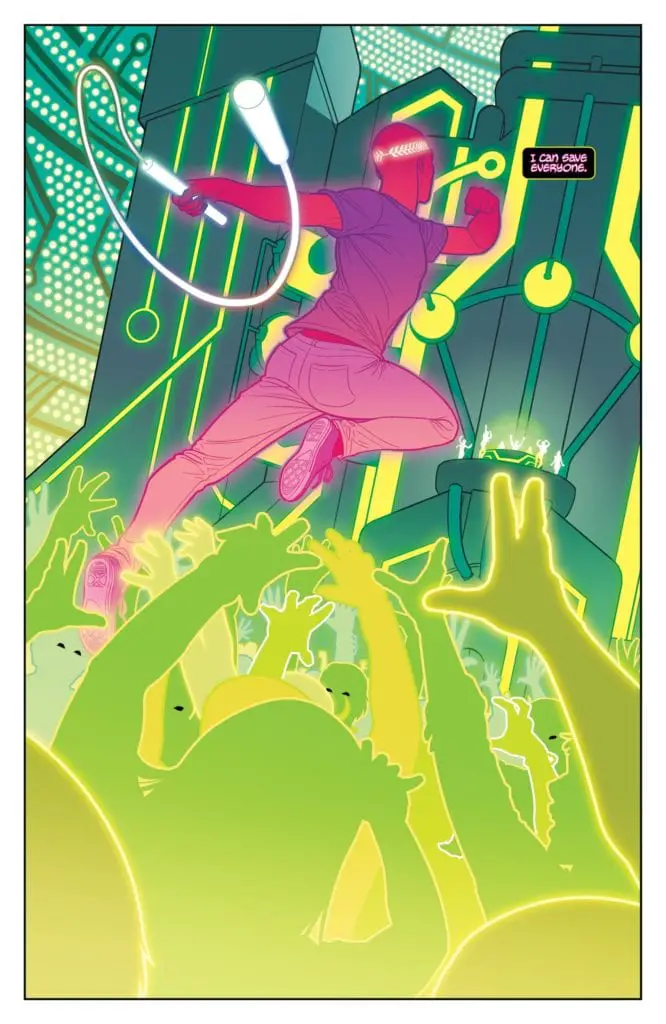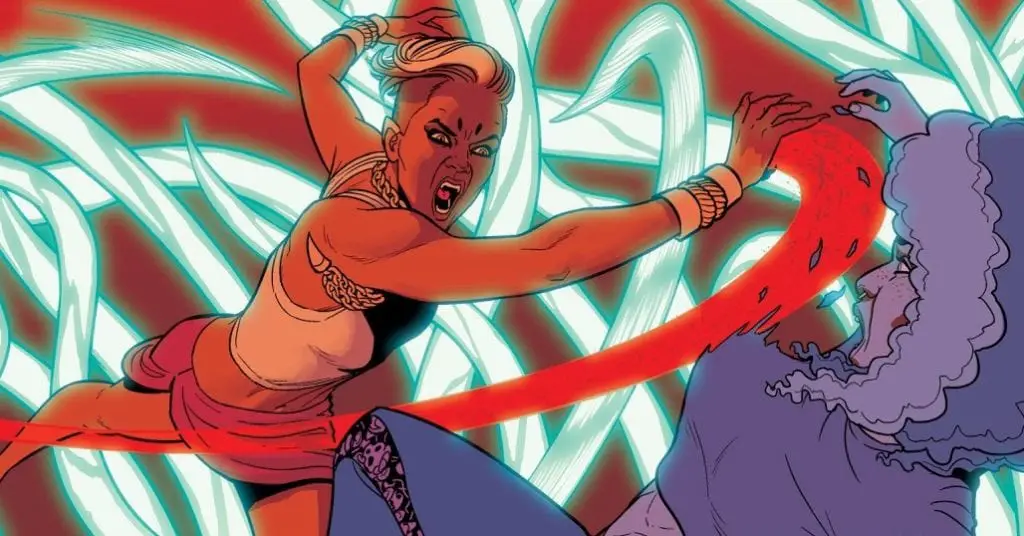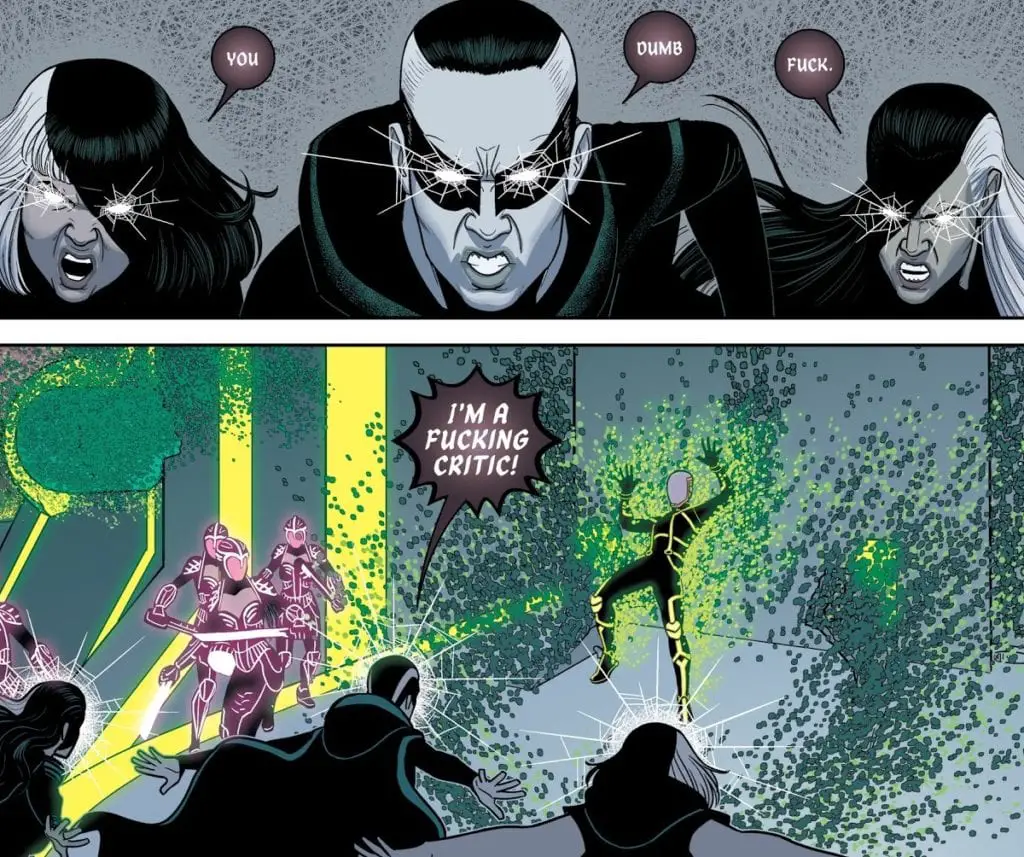The allusion to that famous line in W.B. Yeats’ “The Second Coming,” and Chinua Achebe’s most famous novel, is by no means an accident. Though we’ve seen the process of decay coming for a while—with the Great Darkness, Sakhmet’s murderous spree, and Persephone’s apathy—the latest stage capped Issue #31 with a particularly foreboding tone. Not only has Woden betrayed Dionysus and the Norns, he has also compromised the world outside of the Pantheon with his power trip. And knowing this asshole as we do, he will use that highjacked hivemind to its fullest. Much like the poem and the novel, we’re now at a stage of full-on decadence. All semblance of harmony is well and truly fucked.
Oh, and Sakhmet killed Amaterasu, which is not nice, I guess? More importantly, though: what kind of endgame would this be if we hadn’t a few more things to reel in horror over?
Issue #32
“One More Time”
First, let’s talk consequences.
We start off with Sakhmet returning from her walk and casually telling Persephone she killed Amaterasu. Covering her yawn with a bloodied hand is the epitome of non-chalance, which adds both humour and horror into the gesture. And we can’t have a cat without those apparent contradictions, can we? Persephone responds to this news with utter indifference, which is probably the most appropriate reaction. We’ll come back to these two a bit later when the tempo picks up, and oh dear, it will. For now, it suffices to know that Persephone knows that Sakhmet knows: Persy told Baal of her whereabouts. Some tension is sure to unfold.

From one flavor of unease to another, we head to Valhalla, where Woden basks in his latest and possibly foulest deed so far. A severely weakened Dionysus wakes up amidst the crowd. And just by the color switch, we can synesthetically understand that the cool rave beat of Dionysus’ gig has been absorbed by Woden’s cold, sterile techno. This stark ambience transition should appropriately convey that Dio is stranded in hostile territory, vastly outnumbered. At this point, we’d do well to remember the most peculiar thing about this Wine God. There has always been a code behind the use of his powers, traditionally used for villainous purposes in most stories: bringing joy to many.
Compromising that end is no small deal. Willing to give his all to save everyone, Dionysus is ready to fight. And now, we return to that age-old question: can will alone overcome great adversity?
Back in the Underground, Persephone and Sakhmet have a chat while lying in bed. These two chaotic ladies have a lot in common, so Persephone doesn’t bother to give her any bullshit. The dialogue between the two exhibits that narrative quality I often find in the likes of David Lynch and Quentin Tarantino. That is, the truth coming to light in an ambiance of great tension, where contrasting moods spell danger should someone say the wrong thing. Amaterasu’s last night at the museum should be a cautionary tale. Words, expressions, body language, and the peril of assumptions all play into the interaction. Judging by that particular sum here, it’s only a matter of time until things get violent.
With some anguish in her expression, Persephone admits several things. For starters, she really didn’t trust Sakhmet with the knowledge of Ananke’s murder. This draws from both the similarlities between the two of them and the fact Persy doesn’t trust herself either. She also admits she told Baal of her whereabouts, since she has to answer for hurting (murdering) innocent people. Even now, she admits that there are liberties they cannot take as Gods. Her moral fibre is still there. Throughout this conversation, we see Owly flying in through the door, which means Baal is not far behind. Unfortunately, Sakhmet is aware of it when the Lightning God stands behind her, ready to attack.
Sakhmet dodges the strike, and slashes Baal into a bloody mess. Minerva calls for the cavalry in the Underworld, but The Morrigan decides against lending the aid she promised when she learns this takes place in Persephone’s dwellings. This may be either cowardice, or reluctance to carry out her threat to kill Persy if she ever saw her again. Regardless, Persephone and Baal are on their own against the fiercest God of this Recurrence. Baal goes down pretty quickly, though. The Destroyer poses a more solid resistance, but she hesitates to actually kill her wild, significant other. Sakhmet seizes this reluctance to get the drop on Persephone and gouge her eyes out.

At the brink of calamity, Minerva makes the save, killing Sakhmet with a snap of her fingers. I’m going to leave the jokes of her training paying off aside. The hubris of these Gods during their unchecked Imperial Phase have forced her, a child, to do something she’ll have to live with for the rest of her (ruefully) short life. Baal embraces her, but a surrogate father’s love can’t do away with the trauma this soon.
As for the Valhalla side of things, it’s not any prettier. Dio’s inner monologue is an encouraging foil to the actual events in the panels. He is certainly holding his own against this legion with his lithe skills, but his goal is proving more than a challenge. Keep in mind, he’s already weakened by his lack of sleep as it is. Throughout the fray, we get a callback to that musical motif from WicDiv’s earlier issues. A twisted reprisal of the 1-2-3-4 that served as foundation to much of the comic’s narrative as shit got real. Dio manages to overcome the crowd and reach Woden, but he can only do so much. And Woden’s Valkyries are something he has no energy left to face. But he does so anyway.
The following panels are, quite frankly, an emotional ordeal masterfully done. Dionysus’ inner monologue function as a mix of his own grit and a tragic callback to Gentle Annie’s words back in Issue #30. In spite of his powerful will, there’s not enough of him to do all the good he wants. For a brief, quiet moment within the beat, Jamie’s skills show a glimpse of defeat in Dio’s face, a truly jarring sight to behold.
Still he goes, thinking “One More Time” a la Daft Punk while the Valkyries pummel on him mercilessly. In the end, he falls defeated. But not before the Norns awaken, wrathfully dispelling Woden’s control. The fucker teleports away, like the coward he is, and the show ends with a massive ovation from the public.

But the damage is still done, of which we learn the extent later that night. Persephone meets up with Urdr in Valhalla. The latter reveals that they took Dionysus to the hospital, where he was declared brain dead, though still breathing. I can think of no worse outcome for a character as beloved as he.
When Persephone dismisses Dio’s attempts at helping people as futile, Urdr calls her out on her bullshit. About time. Persy has basically done paltry and petty with the gift of Divinity she so desired. And she can’t seem to give a damn about the horrible things that have happened to them all. In response, Persephone talks crap about her attempts at figuring the Machine out—because of course she God-damned would.
Lashing out, Urdr throws a small irrelevant-looking artifact from the Machine at her, which Persy dodges. The impact triggers something in the artifact, causing it to function as a tracker of sorts. Laura and Cass follow the beeping to a wall, which they break to reveal a hidden staircase. Considering all the harrowing events that occurred on this night, they might as well follow this new path and see where it leads. The view we’re afforded as readers is kept outside the wall, so we don’t get to see what they found. That’s for next issue!

Urdr’s long signature cursing at seeing what lies behind could mean many things. Judging by the latest events, however, we’d best stay on our toes. Stay tuned, lovelies.
The Wicked + The Divine Issue #32 Credits
Writer: Kieron Gillen
Art / Cover: Jamie McKelvie, Matt Wilson

